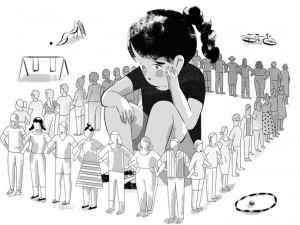 There was a great article in the New York Times recently titled, The Case for Free-Range Parenting. It argues persuasively for the need for our children to have the freedom to explore their worlds on their own without parents acting like helicopters, always hovering around to “protect” them from the apparently dangerous world in which they now live.
There was a great article in the New York Times recently titled, The Case for Free-Range Parenting. It argues persuasively for the need for our children to have the freedom to explore their worlds on their own without parents acting like helicopters, always hovering around to “protect” them from the apparently dangerous world in which they now live.
I think back to my childhood in a small town outside of Hartford, Connecticut. There were no fences separating neighbors. My friends and I would leave home on weekend mornings and not return until dusk. During the winter, we would go skating on the local ponds. During middle school, I rode my bike to and from school (about 8 miles each way!) on some busy roads. And I’m pretty darned sure my parents didn’t even think about what I was up to, much less worry about me. And I did survive.
Oh, how times have changed. Our children now live in such a contained world. I use the word ‘contained’ literally and metaphorically. Literally, houses in Mill Valley, California, where we live, and most locales these days, are all fenced in as are parks, playgrounds, and school yards. Metaphorically, there is rarely a time when our children aren’t contained by the watchful eye of adult supervision, whether at home, school, sports, or after-school activity. Our children are programmed for safety at a time when the benefits of giving them room to run, again, literally and metaphorically, are numerous.
Many parents believe that their children’s world is dangerous. In fact, our children are much safer than they were 25 years ago. If you want your children to be truly safe, don’t drive, don’t have a swimming pool, and don’t leave your children with relatives.
In generations past, if there was a kidnapping or case of child abuse or a child murder in one part of the country, those at a distance would never hear about it. But, in our Internet-fueled world, we hear about the daily threats to our children’s lives however distant or remote they are. As the saying goes, “If it bleeds, it leads” on the news and anything sensational, sinister, or salacious, particularly if it involves children, can dominate newspapers, talk radio, cable news, and the Internet for weeks (until the next “horrible news” enters the news cycle). It’s not surprising that many parents are terrified for their children’s safety.
The topic of free-range children hits home for me on a very personal level. With daughters who are 9 and 7, I experience the conflict between my desire to protect them and my wish to set them free. And, though I know rationally that the world is a remarkably safe place for my daughters, as a parent, I too am susceptible to the irrationality of overprotection. I must admit that on the regular occasions that they are playing or riding their bikes on the sidewalk in our decidedly safe neighborhood, I get a little worried if I don’t hear them outside for a little while.
Last fall, we allowed our daughters (at their urging) to walk alone from school to an after-school activity about a 1/2 mile away. When we told their teachers and mentioned it to our friends, many were shocked that we would allow our children to make such a perilous trek through the mean streets of downtown Mill Valley (note the irony in my tone). The good news is that our girls have made the walk many times and now take great pride in their weekly journey on foot or by bike. We also let them take our dog for walks in the neighborhood, go to the nearby park, and walk to the local arts and crafts store down the street, all without our guidance or protection.
My family also spends time in the mountains skiing, hiking, biking, swimming, kayaking, and just being outside. There are no fences there, just rocks and trees and snow and dirt. And when our girls are up there, it feels as if they are in their element. They explore freely. They create adventures in which they are the stars. They make stuff rather than needing stuff to entertain them. They are rarekly bored and they usually happy.
Yes, there certainly are risks to giving your children the freedom to just be with themselves. And I’m not suggesting that parents should just set their children free blindly. There is a role for coaching, guiding, and monitoring children in their initial experiences as free-range creatures.
But, there are several wonderful gifts we can give our children when we allow them to experience their world as free-range beings. First, the message that the world is a pretty safe place (while also educating them to realistic dangers that exist), thus instilling in them the security and comfort to explore their world. Second, our confidence in their capabilities to take care of themselves without our help. Third, our willingness to set aside our anxieties because we know that freedom is so healthy for them.
And, finally, the knowledge that when they return from their adventures in the big world (even if it only seems big to them), we will be waiting for them with a big hug, a smile on our faces, and, admittedly, a little relief in our hearts.


